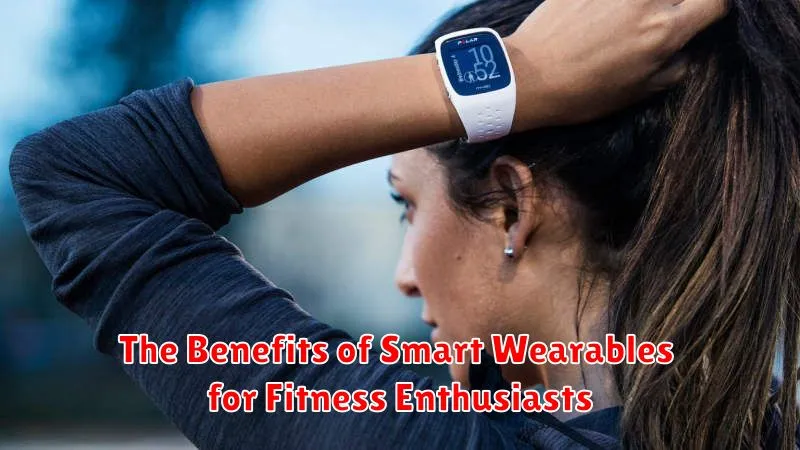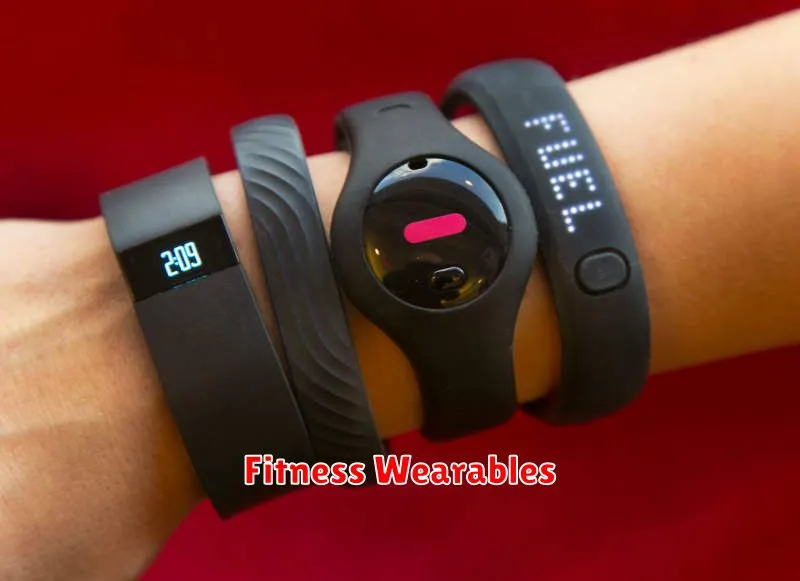The fitness industry is constantly evolving, and one of the most significant changes in recent years has been the rise of smart wearables. These devices, which range from fitness trackers to smartwatches, are transforming the way we approach our health and fitness goals. They offer a wealth of data and insights that can help us track our progress, stay motivated, and make informed decisions about our workouts and nutrition.
From monitoring our heart rate and steps to analyzing our sleep patterns and calorie intake, smart wearables provide a comprehensive picture of our overall health. They’re not just for serious athletes either; they’re becoming increasingly popular among people of all ages and fitness levels. But how exactly are these devices changing the fitness landscape? And what are the implications for the future of fitness?
The Benefits of Smart Wearables for Fitness Enthusiasts

Smart wearables have revolutionized the fitness industry, offering a wealth of benefits to fitness enthusiasts. These devices provide valuable insights into your health and fitness, empowering you to make informed decisions and reach your goals more effectively.
One of the key benefits of smart wearables is accurate tracking. They meticulously record your activity levels, heart rate, sleep patterns, and even calories burned. This detailed information allows you to monitor your progress and identify areas for improvement. By analyzing your data, you can fine-tune your workouts, adjust your diet, and ensure you’re on the right track to achieve your fitness objectives.
Smart wearables also provide real-time feedback during your workouts. With features like heart rate monitors and GPS tracking, you can stay informed about your performance and make adjustments as needed. This immediate feedback can help you optimize your workouts, push yourself harder, and prevent injuries.
Moreover, smart wearables can enhance your motivation and engagement. By tracking your progress and setting goals, these devices keep you motivated and accountable. They can also provide personalized recommendations for activities and workouts, making your fitness journey more enjoyable and engaging.
In conclusion, smart wearables offer numerous benefits for fitness enthusiasts, including accurate tracking, real-time feedback, and enhanced motivation. By leveraging the data and insights provided by these devices, you can optimize your workouts, reach your fitness goals, and lead a healthier lifestyle.
How AI is Enhancing Wearable Fitness Trackers
The fitness industry is constantly evolving, and one of the most significant advancements in recent years has been the rise of smart wearables. These devices, equipped with sophisticated sensors and powerful processors, have revolutionized the way we track our fitness progress. But it’s the integration of artificial intelligence (AI) that is truly taking wearable fitness trackers to the next level.
AI algorithms are now being used to analyze vast amounts of data collected by these devices, providing users with personalized insights and recommendations that were previously unavailable. This includes:
- Accurate workout analysis: AI can identify patterns in your movements and provide feedback on your form, helping you improve your technique and prevent injuries.
- Personalized training plans: Based on your fitness goals, lifestyle, and past performance, AI can generate custom workout plans that are tailored to your individual needs.
- Smart sleep monitoring: AI can analyze your sleep patterns and identify potential sleep disturbances, helping you optimize your sleep quality and feel more refreshed.
- Predictive health insights: By tracking your heart rate, steps, and other vital signs, AI can identify potential health risks and recommend preventative measures.
Beyond these individual features, AI is also enabling the development of connected fitness ecosystems. Wearable trackers can now seamlessly integrate with fitness apps, online communities, and other devices, creating a holistic experience that encourages healthy habits and promotes accountability.
The future of wearable fitness trackers is bright, with AI playing a crucial role in shaping the industry. As AI continues to advance, we can expect even more sophisticated and personalized features that will help us achieve our fitness goals and live healthier lives.
The Future of Fitness with Wearable Technology

The fitness industry is constantly evolving, and one of the most significant drivers of change is wearable technology. These devices, ranging from simple fitness trackers to sophisticated smartwatches, are revolutionizing the way we approach fitness, offering a personalized and data-driven experience.
Wearable technology empowers individuals to track their progress, set goals, and receive real-time feedback on their workouts. From monitoring heart rate and calories burned to analyzing sleep patterns and stress levels, these devices provide valuable insights that can help users optimize their fitness journey.
Beyond individual fitness, wearable technology is also transforming the way fitness professionals operate. Trainers can now access real-time data on their clients’ performance, enabling them to tailor workouts, provide more personalized guidance, and effectively track progress. This data-driven approach leads to more efficient training programs and better results.
The future of fitness with wearable technology is bright. As the technology continues to advance, we can expect even more sophisticated features, seamless integration with other platforms, and personalized recommendations tailored to individual needs. These advancements will continue to empower individuals to take control of their health and well-being, paving the way for a more proactive and data-driven approach to fitness.
Challenges in Implementing Wearables in Fitness
While smart wearables offer immense potential in revolutionizing the fitness industry, their implementation comes with its own set of challenges.
One of the primary challenges is accuracy. Wearables rely on sensors to collect data, and the accuracy of this data can vary depending on factors such as individual body type, movement patterns, and environmental conditions. This variability can lead to inaccurate readings, potentially impacting the effectiveness of fitness programs and users’ motivation.
Another challenge is privacy. Wearables collect a wealth of personal data, including location, sleep patterns, and physical activity levels. The potential for misuse or unauthorized access to this data raises concerns about user privacy and security.
Furthermore, user adoption remains a hurdle. Not everyone is comfortable wearing a device that constantly monitors their activities. Some individuals may find the constant data collection intrusive or feel pressured to meet certain fitness goals.
Finally, integration with existing fitness programs and services presents a challenge. A fragmented ecosystem of fitness apps and devices can make it difficult for users to seamlessly integrate wearable data into their overall fitness journey.
Top Fitness Wearables to Watch in 2024
The fitness industry is constantly evolving, and smart wearables are playing a significant role in this transformation. From tracking steps and heart rate to providing personalized workout recommendations, these devices are becoming increasingly sophisticated and user-friendly. Here are some of the top fitness wearables to watch in 2024:
1. Apple Watch Series 9
Apple’s flagship smartwatch is expected to receive a significant upgrade in 2024. Rumors suggest a new design, improved health tracking features, and possibly even a blood glucose monitor. The Apple Watch Series 9 is likely to remain the top choice for iPhone users looking for a comprehensive fitness tracker.
2. Samsung Galaxy Watch 6
Samsung’s Galaxy Watch is another popular option for Android users. The Galaxy Watch 6 is expected to offer enhanced battery life, more accurate health data, and possibly even support for Google Assistant. It’s a strong contender for those looking for a stylish and feature-rich fitness wearable.
3. Garmin Fenix 8
Garmin is known for its robust GPS watches designed for athletes. The Fenix 8 is expected to offer advanced training features, enhanced battery life, and improved navigation capabilities. It’s a perfect choice for serious runners, hikers, and other outdoor enthusiasts.
4. Fitbit Sense 3
Fitbit is a leader in the fitness tracker market, known for its focus on health and wellness. The Sense 3 is expected to include new stress and sleep monitoring features, as well as improved heart rate tracking. It’s a great choice for those who prioritize overall well-being.
5. Whoop 5.0
Whoop is a popular wearable for athletes who want detailed performance insights. The Whoop 5.0 is expected to offer even more advanced sleep, recovery, and workout analysis. It’s a top choice for those who want to optimize their training and performance.
These are just a few of the top fitness wearables to watch in 2024. With continuous innovation and growing demand, the fitness wearable market is poised for further growth. As technology advances, these devices are becoming more powerful tools for improving health and fitness.
Case Studies: Successful Wearable Fitness Devices
The fitness industry is undergoing a significant transformation thanks to the advent of smart wearables. These devices, equipped with advanced sensors and software, provide users with real-time insights into their fitness levels, helping them achieve their goals and live healthier lives.
Here are some case studies highlighting the success of wearable fitness devices:
Fitbit
Fitbit, a pioneer in the wearable fitness space, has garnered immense popularity for its user-friendly interface, comprehensive tracking capabilities, and social features. The company’s devices, such as the Fitbit Charge 5 and Sense, monitor steps, heart rate, sleep patterns, and even stress levels, empowering users to make informed decisions about their health. Fitbit’s success can be attributed to its focus on data visualization, making it easy for users to understand their progress and stay motivated.
Apple Watch
The Apple Watch, a multi-functional smartwatch, has become a staple in the fitness ecosystem. With its advanced health features, including ECG monitoring, fall detection, and blood oxygen monitoring, the Apple Watch caters to both casual and serious fitness enthusiasts. Apple’s extensive app ecosystem, coupled with its integration with other Apple devices, provides a seamless and comprehensive fitness experience.
Garmin
Garmin, known for its expertise in GPS navigation, has made its mark in the wearable fitness market with its robust and feature-rich devices. Targeting athletes and outdoor enthusiasts, Garmin’s smartwatches and fitness trackers offer advanced features like detailed workout metrics, navigation capabilities, and even music playback. Garmin’s focus on specialized features and high-quality craftsmanship has attracted a loyal following within the fitness community.
These case studies demonstrate the profound impact of wearable fitness devices on the industry. By providing users with real-time data, personalized insights, and motivational tools, these devices are empowering individuals to take control of their health and well-being. As technology continues to evolve, we can expect even more innovative and impactful wearables to emerge in the future.

